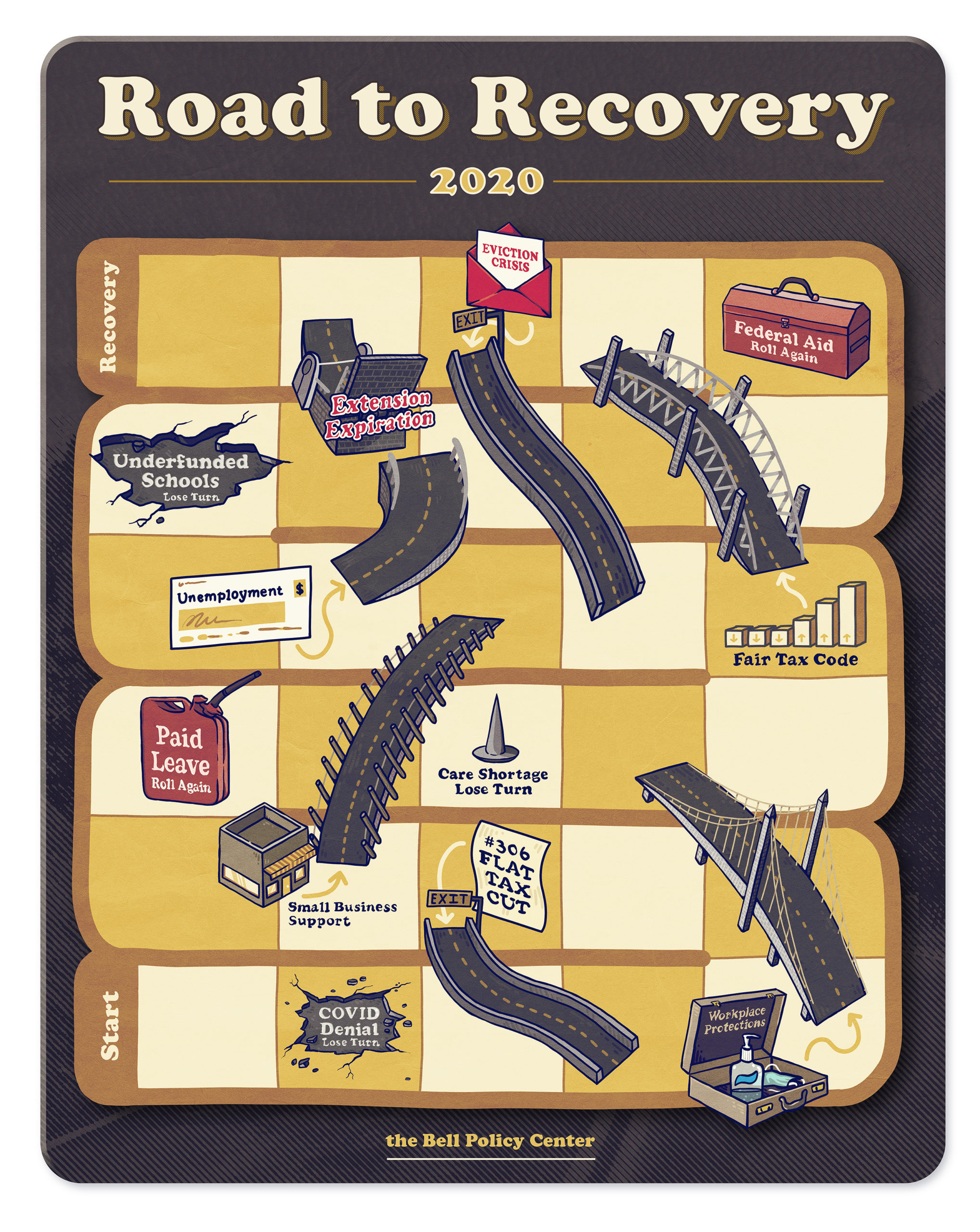Colorado’s Bumpy Road to Recovery
As the recent rise in COVID-19 cases has made clear, Colorado is still dealing with a health crisis. Until we treat the public health emergency, any efforts to recover economically will suffer from future pauses and restarts. Coloradans have demonstrated tremendous resolve and commitment to working together to address the unprecedented pandemic and will need to continue to do so.
As we continue to address COVID-19 and its impacts, we also need to plan for a recovery that better positions our state for the future. In past recessions and in this current crisis we have been presented with two larger choices: believe tax cuts for the wealthy will magically restart our economy, or believe investments in consumers and Colorado communities will build a more diverse and stronger economy. The Trump tax cuts have confirmed what we have known for centuries: Tax cuts that benefit the wealthy, often described as across-the-board tax cuts, do not trickle down and do not pay for themselves.
Colorado’s recovery must be focused on ensuring all Coloradans are economically stable and are safely able to reengage in our economy. As businesses reopen, efforts to boost demand for goods and services are essential. Low-income and middle class Coloradans spend a larger share of their income than corporate shareholders and wealthier households and are the foundation of Colorado’s economy.

Colorado has made significant steps in preparing for a worker, small business, and consumer-based recovery, including many measures passed in the past legislative session, but we still have a long way to go, particularly in employment and worker safety, public fiscal strength, health, consumer protection and financial empowerment, housing, and business recovery.
Employment & Worker Health
Through legislation signed into law this week, Coloradans have more health protections at work and greater access to needed unemployment insurance benefits. Workers should not have to decide between going to work and risking their own health or caring for their children who cannot go to school. They also can no longer be punished for raising concerns about workplace health safety or using their own personal protective equipment.
But with the looming expiration of federal unemployment insurance benefits, including an extra $600 per week, Colorado could be facing a longer-term unemployment and income crisis. As we move forward as a state and country, we will need to find ways to extend unemployment insurance benefits until the economy recovers and ensure workers not traditionally covered by these benefits are continually able to access these benefits. Extending these benefits is not only a strong stimulus to our economy, but it also ensures workers can prepare themselves for new opportunities within our recovery.
Our economy relies upon access to child care, and COVID-19 has pushed an already strained industry to the brink. Colorado will need to develop lasting solutions to child care that ensure affordability for parents, livable wages and advance opportunities for child care workers, and stability with in the industry.
Public Fiscal Strength
The Great Recession taught all states if you cut public investments, you not only prolong the recession, but also cause lasting damage to our most needed public institutions, including higher education. The use of CARES Act funding and the closure of some state-level tax expenditures that benefit wealthy Coloradans has helped us to avoid more horrific cuts, but these fixes are not enough.
Because states cannot borrow, federal support for state and local governments is essential to any recovery. But Colorado cannot rely upon the federal government alone: We must create a fair tax code that properly raises revenue for our current and future needs. And yes, we must continue to evaluate ineffective tax credits and expenditures that have been on the books for too many years without proper justification. Funding must be redirected to educating future Coloradans and consumers that can rebuild our economy.
Health
Colorado cannot recover unless we are healthy. For the first time, all Coloradans will have access to earned paid sick leave, meaning workers don’t have to choose between infecting coworkers and their communities or losing their jobs. In addition to the required COVID-19-related family and medical leave passed at the federal level, Coloradans do have better options during the crisis than they ever have had before.
COVID-19 has demonstrated permanent paid family and medical leave is needed now more than ever. Also, ensuring Coloradans have access to affordable health coverage will be critical, especially as too many individuals and families have lost coverage during the pandemic. Colorado must continue to work on a public option that reduces prices and increases access across the state.
Providing care to aging Coloradans was already difficult before the pandemic, but it has become increasingly difficult. We must find ways to support unpaid and paid caretakers as well as develop more affordable options for long-term care.
Consumer Protection & Financial Empowerment
Thanks to many community leaders and the Financial Equity Coalition, many Coloradans will have a reprieve from the long-term damage extraordinary debt collections could have during a pandemic. The repossession of a car or the garnishment of wages at a time when there are very few options to recover economically could have made recovery almost impossible for too many Coloradans.
As we move forward, not only will Colorado need to reform predatory debt collection and other harmful practices, but also find new ways to create financial products that encourage strong wealth building.
Housing
During a pandemic and stay-at-home orders, a place to call home is perhaps more important than ever. While Colorado has used both state and federal dollars to develop tens of millions of dollars in rental support, there is a looming eviction crisis that could jeopardize communities across Colorado.
Moving forward, Colorado will need to either follow many other states and reinstate an eviction moratorium or develop rental assistance or rental debt relief programs that adequately meet the needs of the crisis. In addition, Colorado will need to work to develop ongoing solutions to the affordable housing crisis that existed even before the pandemic.
Business Recovery
Business in Colorado will have new opportunities to receive loans and direct assistance through two new funds. The Energize Colorado Fund will provide grants and loans to small businesses, primarily those led by veterans, women, minorities, and those located in rural areas who have fewer than 25 employees and were at a disadvantage for receiving federal loans. The CLIMBER Fund would provide capital for working capital loans averaging approximately $100 thousand to over 1,000 of the hardest-hit businesses that had a track record of success prior to the pandemic
To truly recover, Colorado will need to ensure there is both ongoing support to small businesses to sustain their operations and direct support for developing the consumer demand needed to support our critical businesses.
Our Road Ahead
Colorado’s road to recovery will be long and it may have too many twists and turns, but it must remain focused on building a recovery that supports the majority of Coloradans, addresses long-persisting inequities, and builds upon the well-established principle: When we invest in our children, workers, and communities, we produce a consumer-based recovery that is much stronger and lasting.

